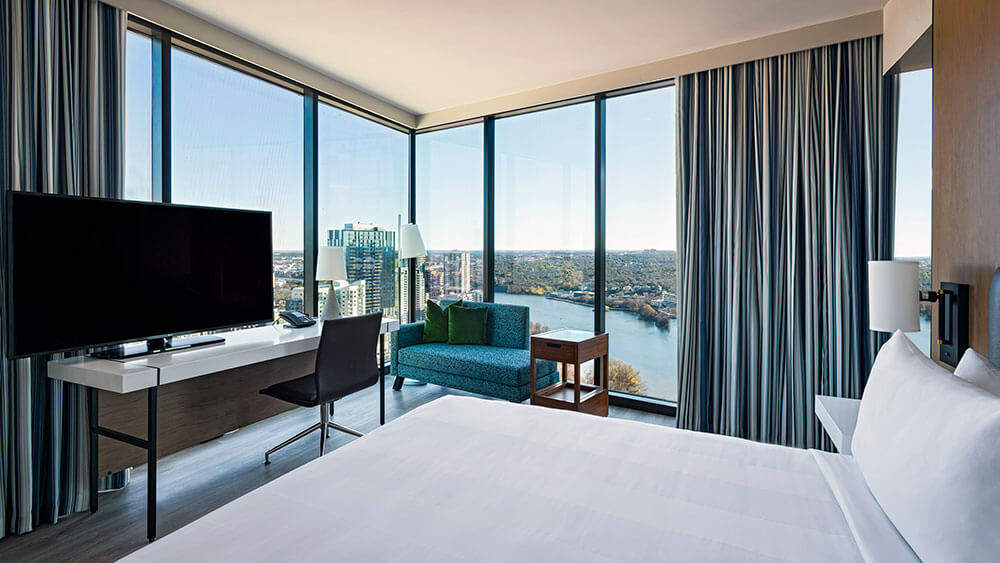
Austin Marriott Downtown offers a completely touchless check-in and check-out experience, as well as elevator and in-room television controls using a personal smartphone. (Courtesy Marriott International)

Convene asked individuals from inside and outside the business events industry to talk about behaviors and other changes brought on by the pandemic that are lasting, and in particular, to share which ones they think are likely to transform events. We offer their insights and opinions on this page and in the rest of our July-August CMP Series, What Will Stick?
Convene asked three hospitality executives — Tammy Routh, senior vice president of Global Sales, Marriott International; Derek DeCross, SVP of Global Sales, IHG Hotels & Resorts, and Asad Ahmed, SVP of Commercial Service, Hyatt — about how the pandemic has changed their industry. Here are their answers, compiled from separate emails into a question-and-answer format.
Are there any customer behaviors/trends in the hospitality space that started during the pandemic that you see continuing post-pandemic?

Tammy Routh
Tammy Routh: There is no question the way we work and where we work has changed. Currently, we are seeing short-term reservations with a longer length of stay and it is by and large leisure travel. The good news is business travel is increasing as is our lead volume and bookings for group business.
There is an increased desire for more contactless experiences throughout the travel journey. We are leveraging contactless technologies available to help reimagine the guest experience and are encouraging guests to use mobile check-in/checkout, mobile key, mobile dining, and mobile requests whenever possible and wherever available.
Derek DeCross: Many travel programs are undergo- ing significant changes, including reduced budgets, creative approaches to budgeting, and shifting focus solely on essential — including customer-facing — travel. We expect the number of short-stay trips to decrease and for them to be replaced with longer, three- to four-day trips.
Travel for business and leisure looks very different than it did a year ago and we are confident that we are putting the right procedures and programs in place to meet these changes. While business travel will take a bit longer to return than leisure travel, we know there is a desire to return to face-to-face meetings and events. Earlier this year, IHG commissioned a survey that found 40 percent of respondents miss face-to-face meetings and the meaningful relationships that come from that.
Recovery so far has been driven by domestic leisure travel in the Americas and Greater China primarily across our essential and suites brands like Holiday Inn, Holiday Inn Express, and Staybridge Suites. In the first quarter of this year, global occupancy steadily increased to nearly 50 percent in March. Greater China remains ahead of the rest of the world as leisure demand continues to grow, with corporate and group bookings on a strong recovery trend as well.
In the Americas, corporate travel has been driven by industries like film and television, logistics, construction, and medical and pharmaceuticals. Government, associations, and consumer products are also starting to return. Government and sports are driving recovery for the groups and meetings segment. We are optimistic that corporate travel and groups will continue to increase throughout the rest of the year and into 2022.

Asad Ahmed
Asad Ahmed: The combination of a shift in work patterns and consumers’ pent-up desire for travel means there is an increasing demand for long-stay travel, even past the pandemic. For example, this year over the July 4 weekend, the average length of stay for Hyatt guests in the Americas increased approximately 50 percent compared to 2019.
Additionally, Hyatt continues to roll out enhanced digital amenities at properties worldwide that give guests more control over how they connect with Hyatt. The impact of the pandemic led us to accelerate digital transformation across the hotel experience in aspects from guest communication, experiences, meetings, and beyond. These efforts to evolve our technology also reduce some of the transactional elements of the front-desk experience.
The idea of the communal lobby and enhanced social spaces in hotels has become very popular. Has that changed during the pandemic? Are people now more likely to stick to their own rooms versus social areas, or has the lack of connection during the past year made people more likely to enjoy those social spaces?
TR: The lobby has always been an essential part of the experience for several of our brands. After more than a year of social isolation, we believe this will continue to be a focal point, with people yearning for interpersonal connections more than ever. We are also seeing that with many offices still being closed or not open to full capacity, a hotel is great option for those interactions that are better served face-to-face.

Derek DeCross
DD: We have seen an increased demand for flexible working spaces. Hotels in some regions have been offering new programs like “Work From Hotel,” which allows people to work flexibly in a hotel guest room or public spaces (where permitted by local regulations) with amenities like free Wi-Fi, food-and-beverage discounts, and free printing. These could be booked for full- or half-day windows.
“Work From Hotel” has been popular in major cities where people have been working from home and may not have a lot of home office space. Individual hotels are meeting this need as our customers work more flexibly.
With the increased demand for flexible working, guests and business clients will continue to want options for hybrid and flexible working spaces, even as companies reopen offices and people return to them. While the option to offer up room inventory as office space will be more challenging as demand for travel returns, it is an opportunity for hotels to better utilize public spaces.
AA:Throughout the pandemic, we witnessed many small businesses greatly struggle following months of lockdowns, so we found new ways to extend care to our communities and use our spaces in new ways. In November 2020, Hyatt launched the Hyatt Loves Local initiative and to date, more than 100 participating Hyatt hotels around the world have collaborated with local, small businesses to offer a complimentary space, resources, and exposure. Direct impact to small business owners to help them persevere during this difficult time and tangible benefits to small businesses partnering with Hyatt hotels as part of this program include Anna Bell’s Mac & Cheese, who utilized complimentary kitchen space at Hyatt Regency Atlanta and sold goods in the hotel’s market. The initiative enabled Anna Bell’s to sell 300 percent more mac and cheese during the holidays in 2020 compared to 2019.
